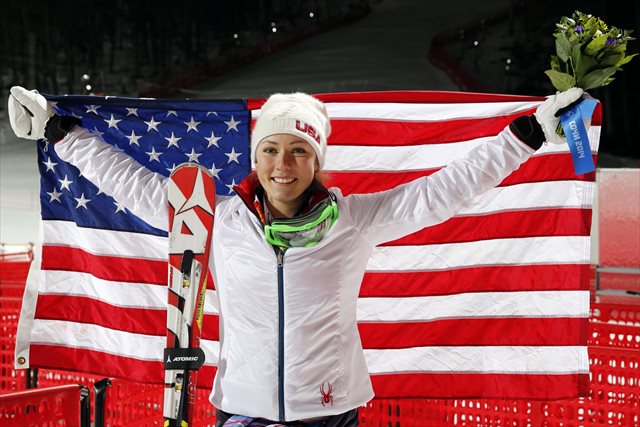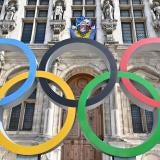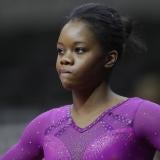
Reviewing the then-U.S.-topped medal table at the close of NBC's Friday night primetime broadcast, Bob Costas noted that its then-27 medals were already the most Team USA had ever won at a Winter Games held outside of North America.
This is true. This is an accomplishment worth celebrating. This is, certainly, one of many reasons why Team USA's performance in Sochi is a far, far cry from the dark days of Calgary '88 (six medals to the U.S.S.R.'s 29) or even, say, Nagano '98 (13 medals, fifth in the table). The U.S. finished with 28 total medals and the runner-up spot in the 2014 table, proving -- if there was still any doubt -- that the struggles of the '80s and '90s are well and truly a thing of Team USA's Winter Games' past.
And yet: "most medals ever won at a Winter Games outside of North America" neatly ignores the fact that after the 12 new events introduced in Sochi, there were also more medals available to win than at any previous Winter Olympics. At Torino 2006, the U.S. won 9.9 percent of all available medals; in Sochi, it won 9.5 percent.
That's obviously a minor difference, but it argues that Team USA hasn't actually made much progress over the past eight years -- and compared to the 14.3 percent figure from Vancouver, where the U.S.'s 37 medals topped the table, over the past four years there seems to be an outright regression. In terms of gold medals, yes, the U.S. matched its nine from 2010 ... but it also finished outside the top-three in the gold count for the first time since Nagano.
An optimist would blame the U.S.'s medal table decline from Vancouver on the shift of venue, and it's true that after going from just across the Washington border to the shores of the Black Sea, the U.S. was never likely to repeat its groundbreaking success in 2010. But there's two problems with that argument, the first being that geography didn't seem to affect our neighbors to the north much; Canada won just one fewer medal in Sochi -- 25, to 2010's 26 -- than it did as the host nation.
The second, and one that must truly worry Team USA officials, is that the introduction of 2014's new events -- many of them American-friendly X-Games-style freestyle competitions -- didn't just help the U.S.'s medal efforts; it carried them. Led by the U.S. sweep of the men's ski slopestyle podium, Team USA won five of its nine golds and 9 of its 28 medals overall in just those 12 events.
Put another way, that's only 19 medals and 4 golds from the same set of events that produced 37 and 9 in Vancouver. The U.S. Olympic Committee really needs to send the IOC a thank-you note; if the Olympic poobahs didn't agree to expand the program, Team USA would have headed to the closing ceremonies with its medal count cut virtually in half.
The IOC did vote for expansion, of course, and no one other than perhaps cranky Dutch speedskating coaches would fault the U.S. for taking advantage. But 18 lost medals from the Vancouver program is still 18 lost medals. By discipline, here's how that deficit broke down:
THE GOOD
Sliding events (2010: 2, 2014: 7, +5 medals): No golds, but medals in all four bobsled events, a return to the skeleton podium after a lengthy abence, and Erin Hamlin's historic luge bronze gave the U.S.'s overall count a big boost.
THE OK
Alpine skiing (2010: 8, 2014: 5, -3 medals): Another medal somewhere for Ted Ligety or Bode Miller would have been nice. But with Lindsey Vonn out, the U.S. was highly unlikely to repeat its record-setting Vancouver performance, and Andrew Weibrecht's Super-G silver was arguably the biggest shock of the entire alpine competition.
Nordic combined (2010: 4, 2014: 0, -4 medals): There was some hope the U.S. could scrape a bronze, but the perfect-storm powerhouse team of 2010 wasn't the same, and no one expected the medal count to be, either.
THE BAD
Team sports (2010: 2, 2014: 1, -1 medals): On the hockey ice, the women entered Sochi as favorites for gold, and after Russia's elimination the men were pegged for bronze at worst. Neither happened. The curling teams, meanwhile, didn't get any closer to the podium than they did in Vancouver.
Snowboarding (2010: 5, 2014: 3, -2 medals): The addition of slopestyle helped mask that Shaun White's demise left the U.S. completely off the men's halfpipe podium; Team USA had claimed seven of the nine medals awarded in the event from 2002 to 2010.
Freestyle skiing (2010: 4, 2014: 1, -3 medals): Second verse, same as the first; while slopestyle and ski halfpipe burnished the U.S.'s freeskiing numbers overall, three moguls medals became one and the U.S. was shut out of aerials.
Figure skating (2010: 2, 2014: 1, -1 medal): Gracie Gold and Ashley Wagner were game, but couldn't prevent the first American shutout from the two individual podiums since 1936.
Cross-country skiing, biathlon, ski jumping (2010: 0, 2014: 0, +/- 0 medals): Many of the losses above (particularly in nordic combined) were expected, but the U.S. was hopeful of making up some ground in these traditional U.S. weaknesses, particularly with world champion Kikkan Randall in the women's cross-country sprint. It didn't happen.
THE UGGGGGGGGLY
Speed skating (2010: 10, 2014: 1, -9 medals): In the end, it probably wasn't the suits, or the altitude training, or the administrative dysfunction, all of which have been proffered as explanations for the U.S.'s stunning failure to medal in any long-track event in Sochi, its first such shutout since Sarajevo '84. After a pratfall of that magnitude, where a team with multiple proven gold-medal favorites can't come any closer to a medal than seventh, the most likely answer seems to be "all of the above."
But at least the long-trackers have some company. After the retirement of Apolo Ohno and a tumultuous, scandal-plauged 2013 that saw arguably the team's best medal hope suspended for tampering with an opponent's skates -- allegedly at the behest of former U.S. coach Jae Su Chun -- the American short track team claimed just one medal itself after grabbing six in Vancouver.
Again, things could have been far worse for Team USA. They could be South Korea, which saw national hero Yuna Kim settle for silver and their proud short track team humiliated by Korean expat Viktor Ahn, whose four medals for Russia were four more than the entire Korean men's team combined. They could be Germany, the Winter Games powerhouse that had never finished worse than second in total medals since its unification and slipped to a sudden sixth (and won the same number of golds as their comparitively tiny neighbors in the Netherlands).
And of course, the U.S. could simply have not been as prepared for the introduction of slopestyle, ski halfpipe and team figure skating. They could have not gotten medals from the surprising likes of Weibrecht, Hamlin, or snowboardcross's Alex Deibold. They could have, you know, not finished with more total medals than any country other than the hosts.
But the bottom line is that even pessimistic projections of the U.S.'s medal tally put the Americans at 30 or more, with Team USA the betting favorite to win the overall medal count. That's the good news -- that after Vancouver, Team USA's expectations in the Winter Games have never been higher.
The bad news is that in Sochi, those expectations simply weren't met.




















